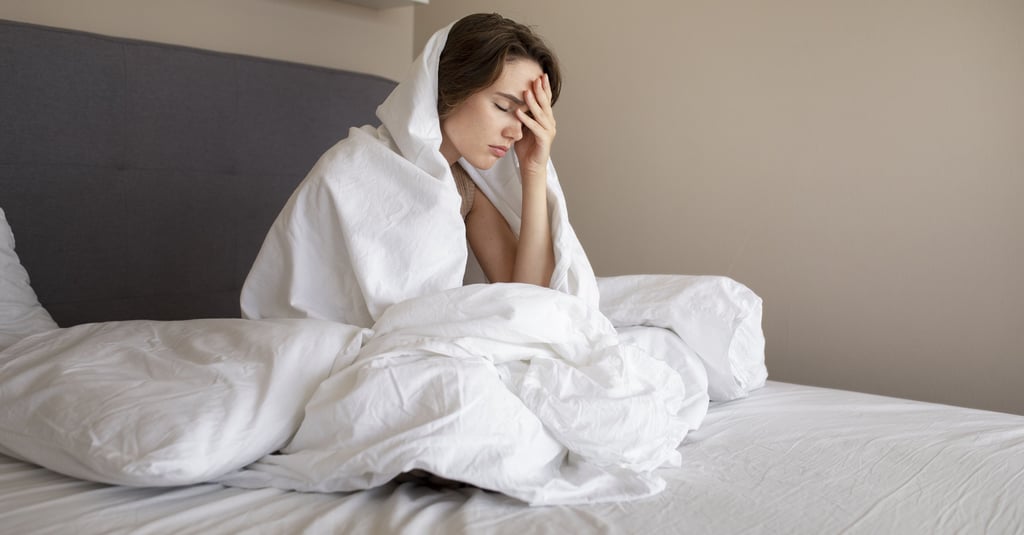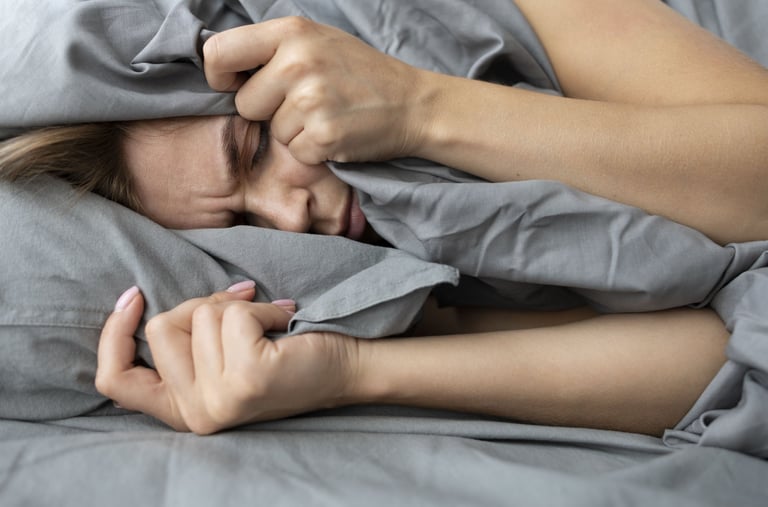Insomnia: what it is, causes, symptoms and how to sleep better even with anxiety or during pregnancy
Insomnia affects millions of people and can be linked to anxiety, pregnancy or stress. Learn what causes it, what the symptoms are and how to get back to sleeping well with simple changes to your daily routine.
DORMIR
Escolha Mast
6/15/20254 min read


Insomnia: what it is, causes, symptoms and how to sleep better even with anxiety or during pregnancy
Insomnia can have organic, emotional and hormonal causes. The good news is that some simple attitudes can help you fall asleep more easily and sleep better.
Insomnia is characterized by difficulty initiating or maintaining sleep, and can occur early in the night, during the early hours of the morning or in the early hours of the morning. It is considered a sleep disorder and can have different causes and intensities. It is more common than it seems: according to the World Health Organization (WHO), around 40% of the world's population reports difficulty sleeping at some point in their lives.
In Brazil, data from the Brazilian Sleep Association (ABS) show that at least 73 million Brazilians suffer from insomnia, with a direct impact on their physical and mental health and quality of life.
Insomnia ICD: is it a disease?
Yes, insomnia is officially recognized as a health condition. The World Health Organization's International Classification of Diseases (ICD-10) classifies insomnia as F51.0 – Non-organic sleep disorders: insomnia.
This means that, even when it is not caused by physical problems, insomnia is considered a disease of functional origin and should be treated with attention. It can be acute (short-term), when it is associated with moments of stress, or chronic, when it persists at least three times a week, for more than three months.
Causes of insomnia
The causes of insomnia are diverse and vary from person to person. In general, it can arise from physical, hormonal, emotional and even behavioral factors.
The most common causes are:
Stress and anxiety: situations of worry about work, family or health can “accelerate the mind” and prevent the relaxation necessary to fall asleep.
Hormonal changes: such as pregnancy, menopause or thyroid disorders.
Excessive use of stimulants: such as caffeine, nicotine and some medications.
Prolonged use of electronic screens at night, such as cell phones and TV, which impair the production of melatonin, the sleep hormone.
Physical illnesses or chronic pain, such as fibromyalgia, sleep apnea or reflux.
Depression, restless legs syndrome and other mental disorders.
Research indicates that low production of serotonin, a neurotransmitter linked to well-being, may be associated with sleep disorders, such as insomnia.
Insomnia and anxiety: what is the relationship?
Insomnia and anxiety often go hand in hand. Anxiety activates the nervous system, increases heart rate and makes it difficult to switch off in order to fall asleep.
Studies from Harvard University indicate that people with anxiety disorders are two to three times more likely to develop chronic insomnia. In addition, sleep deprivation further aggravates anxiety symptoms, creating a cycle that is difficult to break.
Therefore, it is essential to take care of not only your sleep, but also your mental health as a whole. Breathing, relaxation techniques and psychotherapy can help a lot.
Insomnia during pregnancy
Pregnancy is a unique time — but it is also full of physical and emotional changes that can directly affect your sleep. Insomnia is common, especially in the first and third trimesters.
The main causes of insomnia during pregnancy include:
Hormonal changes, such as increased progesterone
Increased frequency of nocturnal urination
Heartburn, reflux or abdominal discomfort
Anxiety about labor or the baby
Difficulty finding a comfortable position
To alleviate symptoms, it is important to maintain a sleep routine, avoid liquids at night and use supportive pillows to sleep better.
If insomnia persists, it is essential to talk to your obstetrician before resorting to any type of medication or supplement.


Symptoms of insomnia
The symptoms of insomnia go beyond difficulty sleeping. When sleep is not sufficient or restful, the body and mind feel the effects the following day.
See the main signs:
Difficulty falling asleep
Waking up several times during the night
Waking up very early and not being able to go back to sleep
Feeling of light sleep or not having rested
Tiredness and drowsiness during the day
Irritability, anxiety or sadness
Difficulty concentrating and memory loss
Poor performance at work or in studies
When these symptoms last more than a few nights, it is time to investigate the causes and seek help.
Recommendations
Changing some habits can make all the difference for those who suffer from insomnia. See simple and effective actions:
Reduce caffeine, especially in the afternoon and evening. Coffee, dark teas, chocolate and soft drinks can affect sleep;
Avoid intense physical exercise close to bedtime, but practice light activities regularly, as they help reduce anxiety;
Disconnect from screens at least 1 hour before going to bed. The blue light from cell phones and TV interferes with the production of melatonin;
Establish fixed times to sleep and wake up, even on weekends;
Create an environment that is conducive to sleep: a dark, quiet room, a comfortable temperature and a suitable mattress;
Use relaxation techniques, such as deep breathing, meditation or listening to calm music;
Avoid using the bed to work or watch TV. Leave it only for sleeping or intimate moments;
Relax before going to bed: take a warm bath, read a book or drink chamomile or fennel tea;
Try to sleep only when you are sleepy. If you do not fall asleep after 30 minutes in bed, get up and do a quiet activity. Come back later.
Warning
Chronic insomnia needs to be evaluated by a health professional. Sleeping poorly every day is not normal, nor is it “a whim”.
Going without sleep for long periods can affect the immune system, increase the risk of hypertension, obesity, diabetes, depression and even cardiovascular diseases. Sleep is as essential to life as nutrition and hydration.
According to the National Sleep Foundation in the US, adults who sleep less than 6 hours a night have a 13% higher risk of premature death than those who sleep between 7 and 8 hours.
Therefore, if you have not been able to sleep well for more than three weeks, or if the problem affects your quality of life, seek a doctor or sleep specialist. The right help can transform your routine and restore your well-being.
Thank you for being here. Taking care of your sleep is taking care of your health. May you sleep better every night. Until next time!
ESCOLHA MAST
Escolha Mast is an informative website that publishes blog posts and also promotes products that can help you in your quest for health and well-being.
CONTACT INFORMATION
Email: escolhamast@gmail.com
Phone: +55 068 99981-0331
© 2025. All rights reserved to Escolha Mast.
Choose to live well!
